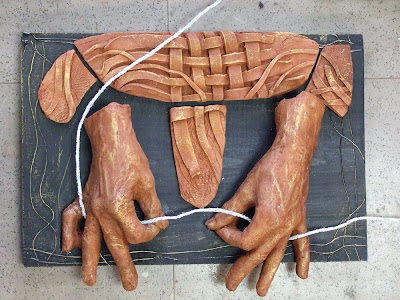"This is an absolute necessity for anybody today. You must have a room, or a certain hour or so a day, where you don’t know what was in the newspapers that morning, you don’t know who your friends are, you don’t know what you owe anybody, you don’t know what anybody owes to you. This is a place where you can simply experience and bring forth what you are and what you might be, This is the place of creative incubation. At first you may find that nothing happens there. But if you have a sacred place and use it, something eventually will happen."*
Joseph Campbell, in 1985 interview with Bill Moyers
I just recently took a brief trip to New Mexico, to see the subtle dance of spring spread over th0se vast, sun washed lands, and to renew, if only briefly, my acquaintance with the Rio, the Rio Grande, the "big river" that is not really a very big river at all, compared to the great rivers of the east. And yet, the Rio is the slender, turquoise, serpentine Goddess of those dry lands, bringing generous life to all the places she travels through on her long, miraculous journey.
Not so long ago, and in many places still, all rivers were Goddesses (the Danube, the Nile, the Ganges, the mystical river of Saraswati)........how differently might we live in the world, when a river is also a Goddess?
While travelling, this quote from Joseph Campbell came to mind. Especially while I travel, I often find myself remembering that the whole world can be a sacred space. That a picnic of sardines and rice cakes under a cottonwood tree, can be a sacred space. Or a sacred space can be a room, or even a table at the library if need be, a place apart. At last, the sacred place has to be the room of one's mind, the closing of doors, for a while at least, so that you find your feet "on the pollen path", so you open your eyes to see, as the Navajo chant goes, that Beauty is all around you.
I have two young 10 year old friends who have what they call "beauty moments"; they will both wave their hands in the air in appreciation of anything that strikes them as beautiful, whether it's a bumble bee, or a painting, or a nice plate of lasagna. I love their aesthetic thank yous. How important it is to take the time to recognize and appreciate the sustaining power of the beautiful.
the Artist brushes a wash of violet,
a moment's gasp of yellow
laughter
in the sand
Yesterday, I was delighted to see blankets of color, poppies, lupine, other wildflowers, dotting the brown landscapes I drove through. Stopping at a gas station, I stood behind a trucker who was actually complaining about having to wash the pollen off of his truck! "
It's really bad", he was telling the cashier, "
in Texas"."Bad!" I couldn't believe it! Apparently the fuming chrome of his diesel truck is the only beauty this man sees in the palette of spring. Such a weird, and sad, contrast to the mind of the Hopi, with their reverence for the
Butterfly Woman, the Pollinator. Or the Navajo, who anoint girls when they come of age with yellow pollen, so they will walk in beauty on the "Pollen Path". How can we have so much, and yet be so ignorant about the sheer toxicity of our psychic environment? Even going into my favorite coffee shop, I put on my earplugs to block out the background of radio and commercials. I found myself soaking up the stillness of the Gila Wilderness yesterday like Chi, like Prana, like water when thirsty. In the silence, in the wilderness, you can hear the soft voice of your inner life, the voices of the conversant, synchonistic world, the inspiration of the Muses, the dream language of the soul.
We need these places, these sacred places, whether they be a room or a canyon, to find our Selves. We also need the intention to make it so, to weave the cocoon, to cast the magic circle, to c0-create the exchange. Then, emerging anew, we can also cast butterflies, dancing into the world.

http://www.rainewalker.com/butterflywoman.htm
MOYERS: I like the idea that it is not the destination that counts, it’s the journey.
CAMPBELL: Yes. As Karlfried Graf Durckheim says, "When you’re on a journey, and the end keeps getting further and further away, then you realize that the real end is the journey itself." The Navajo have that wonderful image of what they call the pollen path. Pollen is the life source, The pollen path is the path to the center. The Navajo say:
"Oh, beauty before me, beauty behind me,beauty to the right of me, beauty to the left of me, beauty above me, beauty below me, I’m on the pollen path."






 **
**













